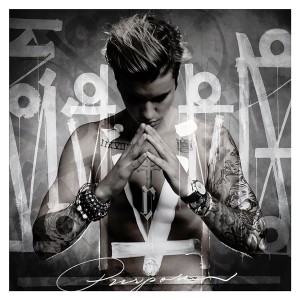Justin Bieber’s last few years have been tumultuous, to say the least. At the beginning of his career he was a teen idol who—likely under the direction of a PR team—always said and did the right things. Then, as he grew older, he developed more individuality; ultimately manifesting itself in the form of eggs, drag races, garbage-can urinals, and half-hearted “hold-me-back-bro” attempts at assaulting paparazzi. Biebs’ poor behaviour and scrapes with the law caused him to become the laughing stock of the internet, tabloids, and the general public. Thus, Bieber’s newly released album Purpose comes at a pivotal point in his life as he transitions from adolescence to adulthood.
The album experiments with new musical styles: It’s clear that the days of teen pop Bieber are far behind. The album is a mélange of slow trap-infused jams, hip-hop tracks, and pop music hits. In “Life is Worth Living” and Children,” Bieber croons over piano music; “Love Yourself” has a folksy guitar accompaniment. The album’s sole guest verses are from hip-hop megastars Big Sean, Nas, and Travis Scott. In “No Sense” and “We Are,” Bieber uses his rhythmic abilities to create his own hip-hop flow, while “I’ll Show You,” “What Do You Mean?,” and “Sorry” are pop songs that have already proved themselves popular on commercial radio.
The album is incredibly well-produced throughout: “No Sense” is a case in point, which has a beat that is part ethereal and part hard-hitting; however, despite the production tricks, one cannot help but shake the feeling that some of these pop instrumentals (“What Do You Mean?” in particular) are better suited for a Travelocity commercial than this highly anticipated comeback album.
Although his production has changed for the better, his lyrics are reminiscent of his teen-pop era. Each song seems to be a love letter to an unidentified person who goes by the name of “baby.” “Life is Worth Living” is his best song lyrically, but that’s not saying much. He begins each song with a few thoughtful bars, but he never tells a good story, instead choosing to devolve every song into a love letter. Bieber takes few risks with his lyrics on his new album, which is disappointing to those who wished to see his music evolve beyond teen pop.
Paradoxically, Bieber could improve his music by taking less agency over his own lyrics. He is listed as a writer on every song, which is admirable, but his lyrics remain weaker than those of most competing musicians. Bieber’s next album could also benefit from more guest features. Nas adds a masterful verse to “We Are.” Travis Scott prevents “No Sense” from becoming too repetitive by jumping in at the last minute. Big Sean is the best part of the lacklustre “No Pressure.”
Bieber tries to do too much in one album. His vocals are impressive and production is impeccable, but he could have improved this project by focusing more on one musical style. It makes sense that Biebs would want to experiment with many different genres—he is trying to escape his teen pop reputation after all—however, his lyrics too often revert back to the same themes that brought him hits in years past. Purpose is not the impressive album it could have been, but it shows some signs of definite improvement.
Standout Tracks:
“No sense” and “Life Is Worth Living.”
Sounds like:
A confused mix of Justin Timberlake and Chris Brown
Best Lyric:
Life is worth living so live another day / The meaning of forgiveness / People make mistakes doesn't mean you have to give in








